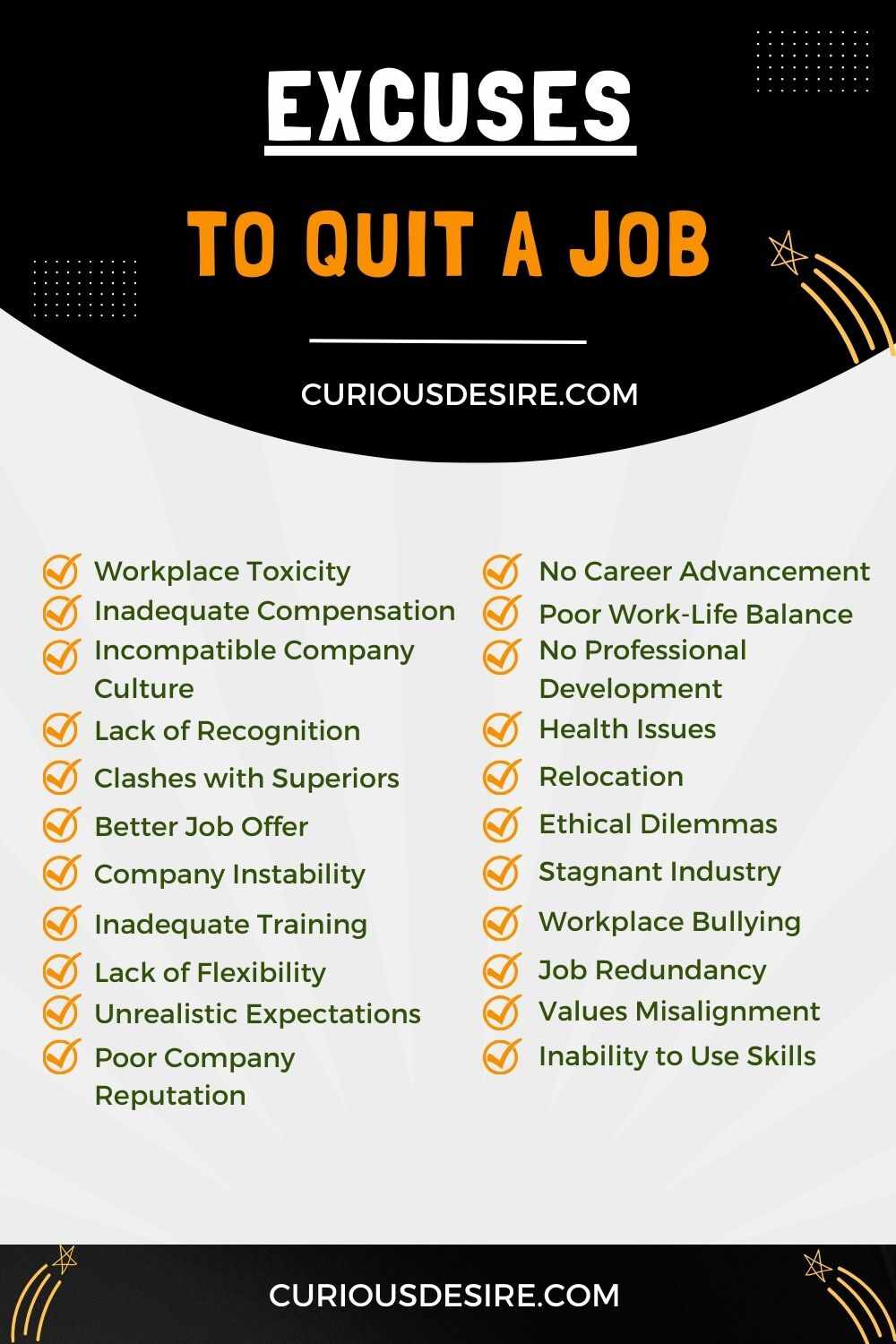In the working world, deciding to quit your job is a big choice that lots of people face. You might be thinking about it because you want to grow personally, you’re not happy with your current work situation, or unexpected things have happened.
Apart from the usual reasons people quit, sometimes you might want a more unique excuse to leave. In this article, we’ve mixed it up and given you lots of different excuses for quitting a job.
Whether you want to get away from a not-so-great work environment, find better opportunities, or take care of your mental health, these excuses cover the many sides of the tricky decision to quit your job.
By looking into these 30 valid excuses, you can understand why people make this choice and find your way in your career with a clear goal.
5 Best Excuses To Quit A Job:
- Unhealthy Work Environment
- Lack of Career Advancement
- Lack of Recognition
- Incompatible Company Culture
- Lack of Flexibility

Excuse 1: Unhealthy Work Environment
A toxic work environment can become a breeding ground for stress, anxiety, and deteriorating mental health. When negativity and conflict pervade the workplace, it adversely impacts the well-being of employees.
Recognizing the signs of toxicity in your work environment is not merely an excuse; it’s a crucial step toward preserving your mental health and overall job satisfaction.
Toxicity can manifest in various forms, such as constant office politics, unproductive competition, or even bullying. The impact of a toxic work environment goes beyond the office walls, affecting personal relationships and one’s overall quality of life.
If you find yourself in a situation where the work atmosphere is consistently negative, it’s a valid excuse to consider leaving for a more supportive and healthier workplace.
Excuse 2: Lack of Career Advancement
A sense of stagnation in your professional journey can be disheartening, leading to frustration and a lack of motivation. If you perceive that your current role offers no tangible prospects for career advancement, it becomes a valid excuse to explore new opportunities.
Career growth is a fundamental aspect of job satisfaction, and feeling trapped in a position with limited progression can hinder your overall professional development.

When considering a change due to a lack of career advancement, it’s essential to assess not just the vertical growth within the current organization but also the potential for acquiring new skills and taking on challenging responsibilities.
Choosing to leave in pursuit of a more growth-oriented environment aligns with your aspirations and sets the stage for a more fulfilling career trajectory.
Excuse 3: Inadequate Compensation
Financial considerations are a significant factor in the overall job satisfaction equation. If your efforts, skills, and contributions are not reflected in your compensation package, it becomes a justified excuse to explore opportunities that offer better remuneration.
Feeling undervalued and underpaid can lead to dissatisfaction and demotivation, impacting both your professional performance and personal well-being.
In today’s competitive job market, it’s essential to align your compensation with industry standards and your level of expertise. Conducting market research to understand the prevailing salary ranges for your role and experience can empower you to make an informed decision.
Choosing to leave for better compensation not only addresses your financial needs but also reflects your commitment to fair and equitable remuneration for your skills.
Excuse 4: Poor Work-Life Balance
Achieving a harmonious balance between work and personal life is crucial for overall well-being. Jobs that consistently demand excessive time and energy, leaving little room for personal pursuits and relaxation, can significantly impact your mental and physical health.
Recognizing the importance of work-life balance is not just an excuse but a proactive step toward preserving your overall quality of life.
A poor work-life balance can manifest in long working hours, constant pressure to be available outside of regular office hours, and an unhealthy expectation of perpetual productivity.
Such conditions can lead to burnout, stress-related health issues, and strained personal relationships. Opting to leave for a position that offers a healthier balance acknowledges the importance of maintaining a sustainable and fulfilling lifestyle.
Excuse 5: Lack of Recognition
Appreciation for hard work and dedication is a fundamental aspect of job satisfaction. If your contributions consistently go unnoticed or unacknowledged, it’s a valid excuse to explore workplaces that value and recognize your efforts.
Recognition not only boosts morale but also serves as a motivating factor to continue delivering exceptional performance.
In an environment where achievements are overlooked, employees may experience a decline in engagement and commitment. Feeling undervalued can lead to a sense of disillusionment and negatively impact job satisfaction.
Choosing to leave for a workplace that prioritizes recognizing and rewarding accomplishments ensures a more positive and motivating professional experience.
Excuse 6: No Professional Development Opportunities
A job that lacks opportunities for skill enhancement and career growth may not align with your long-term aspirations. Professional development is essential for staying relevant in a dynamic job market and fostering personal growth.
Choosing to leave in pursuit of roles that offer continuous learning opportunities is not just an excuse but a strategic move to invest in your future.
A lack of professional development opportunities may manifest in limited training programs, an absence of mentorship, or a dearth of projects that challenge and expand your skill set.
Opting for a position that prioritizes and invests in your professional growth ensures that you remain competitive and adaptable in the ever-changing job market.
Excuse 7: Incompatible Company Culture
Cultural misfits within a company can lead to a sense of isolation and hinder collaboration. Choosing a workplace aligned with your personal values and working style is essential for a harmonious professional experience.
Company culture encompasses the shared values, beliefs, and behaviors within an organization. A misalignment with the prevailing culture may lead to feelings of discomfort, difficulty in connecting with colleagues, and challenges in contributing effectively to team goals.
Opting to leave for a workplace with a culture that resonates with your values enhances job satisfaction and promotes a more cohesive and collaborative work atmosphere.

Excuse 8: Health Issues
Prioritizing personal health is paramount, and persistent health issues arising from the workplace can be a valid reason to seek a new job. Chronic stress, burnout, and other health-related concerns can significantly impact both your physical and mental well-being.
Unhealthy work-related stressors may include an excessively demanding workload, unrealistic expectations, or a lack of support mechanisms. Prolonged exposure to such conditions can lead to adverse health effects, ranging from anxiety and sleep disturbances to more severe conditions like cardiovascular problems.
Choosing to leave for a job that promotes a healthier work environment is a responsible decision that safeguards your well-being.
Excuse 9: Conflict with Management
Frequent clashes with superiors or ineffective communication with management can create a hostile work environment. Seeking a workplace with better leadership dynamics becomes a reasonable choice when such conflicts persist.
Conflict with management can arise from a variety of sources, including differences in communication styles, conflicting expectations, or even personality clashes.
Prolonged tension can impede career growth, limit opportunities for advancement, and negatively impact overall job satisfaction. Opting to leave for an environment with effective and supportive leadership ensures a healthier professional dynamic and sets the stage for career progression.
Excuse 10: Relocation
Personal or family circumstances that necessitate a move can make it impractical to continue with the current job. Recognizing the impact of life changes and prioritizing personal commitments is not just an excuse but a responsible decision to align your professional and personal life.
Relocation may be prompted by various factors, including a partner’s job transfer, family considerations, or a desire for a lifestyle change. In such situations, staying in a job that requires geographical stability may lead to increased stress and challenges in maintaining work-life balance.
Opting to leave for a position that accommodates your relocation needs ensures a smoother transition and minimizes disruptions to both your personal and professional life.
Excuse 11: Better Job Offer
A more attractive job offer with superior benefits, growth prospects, or work-life balance is a compelling excuse to consider switching roles.
A better job offer may include elements such as a higher salary, comprehensive benefits, opportunities for skill development, or a more supportive work environment.
Choosing to leave for a position that aligns with your career goals and offers improved overall conditions is a proactive step towards building a more fulfilling professional future.
Excuse 12: Ethical Dilemmas
Unethical practices within a company can challenge personal values and principles. Leaving to maintain personal integrity is not just an excuse but a principled decision to uphold ethical standards.
Ethical dilemmas may arise from situations involving fraud, dishonesty, or violations of legal and ethical standards. Choosing to leave a job where such practices prevail is a conscientious choice that reinforces the importance of ethical behavior in the professional sphere.
Opting for a workplace with a strong ethical foundation supports your commitment to integrity and fosters a more positive and trustworthy work environment.
Excuse 13: Company Instability
The financial instability of a company or rumors of downsizing can trigger job insecurity, justifying the search for more stable employment. Recognizing the potential risks associated with company instability is not just an excuse but a pragmatic decision to safeguard your career and financial well-being.
Company instability may manifest in various forms, including financial losses, leadership changes, or a decline in market share. In such situations, job security becomes a legitimate concern, prompting individuals to explore opportunities with organizations that demonstrate financial resilience and a commitment to long-term stability.
Opting to leave for a more stable employment environment provides a sense of security and ensures a more predictable career trajectory.
Excuse 14: Stagnant Industry
Industries facing decline or technological disruption may prompt individuals to seek opportunities in more promising fields. Recognizing the challenges posed by a stagnant industry is not just an excuse but a strategic move to stay relevant and secure long-term career prospects.
Stagnant industries may experience a decline in demand for products or services, reduced innovation, or increased competition from more dynamic sectors. Remaining in a declining industry can limit professional growth opportunities and expose individuals to the risk of job instability.
Choosing to leave for a field with better growth prospects ensures adaptability and positions you for success in a more vibrant and evolving professional landscape.
Excuse 15: Inadequate Training
Inadequate training may manifest in a lack of formal onboarding processes, limited access to professional development resources, or insufficient support for skill enhancement. Remaining in a role that does not prioritize training can lead to a stagnation of skills, hindering your ability to adapt to industry changes.
Choosing to leave for a job that emphasizes continuous learning ensures that you remain at the forefront of your field and enhances your overall professional competence.
By addressing these excuses comprehensively, individuals can navigate the complexities of leaving a job with confidence and clarity. Recognizing the validity of these reasons enables informed decision-making, ensuring that career transitions are strategic and aligned with individual goals and values.
Excuse 16: Unrealistic Workload
Unmanageable workloads can be a silent yet powerful driver of burnout, negatively impacting both physical and mental well-being. Individuals experiencing an overwhelming workload often find it challenging to maintain a healthy work-life balance.

The constant pressure to meet unrealistic expectations can lead to stress, fatigue, and a decline in overall job satisfaction.
Choosing a job with a more realistic workload is not just a preference; it’s a crucial self-care measure. Employees have the right to seek a work environment that respects their time and energy, allowing for reasonable task completion without sacrificing personal health.
By opting for a job with manageable expectations, employees can proactively mitigate the risk of burnout, fostering a more sustainable and fulfilling professional journey.
Excuse 17: Dissatisfaction with Job Responsibilities
A profound sense of dissatisfaction often stems from a misalignment between assigned tasks and an individual’s skills, interests, or career aspirations. When there is a significant mismatch, employees may find themselves disengaged and uninspired in their roles.
Job responsibilities that fail to tap into one’s strengths and passions can lead to a decline in motivation and overall job satisfaction.
Seeking a change based on dissatisfaction with job responsibilities is a valid excuse to explore new opportunities. It is an acknowledgment of the importance of alignment between professional roles and individual strengths.
Individuals may choose to transition to positions that not only leverage their skills effectively but also provide a sense of purpose and fulfillment.
Excuse 18: Personal Development Misalignment
The absence of a clear path for personal development can lead to a sense of complacency and hinder long-term career aspirations.
Recognizing the importance of personal development, individuals may choose to quit a job that lacks the necessary resources and support for growth.
This excuse is not merely a desire for change; it’s a strategic move to invest in one’s future. Exploring opportunities that offer mentorship, training programs, and a clear trajectory for advancement becomes a priority.
In the realm of personal development misalignment, employees are empowered to seek roles that foster continuous learning and skill enhancement. By prioritizing growth, individuals can craft a career that aligns with their long-term professional goals and aspirations.
Excuse 19: Workplace Bullying
Experiencing bullying or harassment in the workplace is a severe violation of professional norms and personal well-being. The detrimental effects of workplace bullying can extend beyond the immediate emotional impact, affecting job performance, mental health, and overall job satisfaction.
Seeking a safer and more respectful environment is not just a justifiable excuse; it’s a necessary step toward preserving one’s dignity and mental health. Individuals subjected to bullying or harassment may choose to quit a job to escape a toxic work culture and find a workplace that prioritizes respect and inclusivity.
Excuse 20: Lack of Flexibility
In the era of remote work and evolving work structures, flexibility has become a key factor in job satisfaction. A job lacking flexibility may no longer align with the lifestyle preferences and demands of modern professionals.
Choosing to quit a job due to a lack of flexibility is not just a matter of convenience; it’s a strategic decision to align work with the evolving needs of individuals. The desire for a flexible work arrangement is often linked to improved job satisfaction, productivity, and overall well-being.
In a landscape where flexibility is increasingly valued, individuals may opt for roles that provide remote work options, flexible hours, or alternative work arrangements. By prioritizing flexibility, employees can contribute to the creation of a more adaptive and employee-friendly work culture.
Excuse 21: Job Redundancy
Job redundancy, resulting from automation, restructuring, or economic challenges, can be a harsh reality faced by employees. While redundancy is often beyond individual control, it remains a practical reason to explore new employment options.
The uncertainty and potential job loss associated with redundancy prompt individuals to assess their career trajectories and seek stability in a changing professional landscape.
Exploring new employment opportunities in the face of job redundancy is not just a reaction to adversity; it’s a proactive step toward securing a more stable and promising future. Individuals may choose to transition to industries with growing demand or seek roles that align with their transferrable skills.
Excuse 22: Unrealistic Expectations
Consistently facing performance demands that exceed realistic expectations can create a high-stress environment, leading to burnout and decreased job satisfaction.
Choosing to seek a role with more reasonable requirements is not a sign of weakness; it’s a commitment to sustainable professional performance. Individuals may opt for positions where expectations are aligned with their skills, experiences, and the broader context of their roles.
In the pursuit of realistic expectations, employees contribute to the creation of a healthier work culture that values the well-being of its workforce. By prioritizing achievable goals, individuals can foster a positive work environment that encourages sustained productivity and job satisfaction.
Excuse 23: Corporate Values Misalignment
A misalignment in core values between an individual and the company can create a profound sense of discomfort and disconnection. When corporate values clash with personal beliefs, employees may find it challenging to contribute wholeheartedly to the organization’s mission and vision.
Justifying a search for a more aligned work environment is not just about personal preferences; it’s a principled decision to uphold one’s values and integrity. Individuals may choose to explore opportunities with organizations whose values resonate more closely with their own.
Addressing corporate values misalignment requires a thoughtful assessment of organizational culture and values. By choosing to work in environments that share similar values, individuals contribute to the creation of a workplace where employees feel a sense of belonging and purpose.
Excuse 24: Poor Company Reputation
A tarnished company reputation due to legal issues, scandals, or unethical practices can have far-reaching consequences for employees. Associating with a company with a poor reputation may negatively impact an individual’s professional image, career trajectory, and future job prospects.
Necessitating a move to preserve professional integrity is not just an excuse; it’s a strategic decision to safeguard one’s reputation. Individuals may choose to explore opportunities with organizations known for their ethical practices and positive industry standing.
Addressing poor company reputation involves a careful evaluation of an organization’s track record and commitment to ethical conduct.
Excuse 25: Inadequate Benefits
Insufficient benefits, whether in terms of healthcare, retirement plans, or other perks, can contribute to overall job dissatisfaction. Seeking positions with better overall packages is not just a desire for additional perks; it’s a strategic move to secure a more comprehensive and supportive employment package.
Choosing to quit a job due to inadequate benefits reflects a commitment to holistic well-being. Individuals may explore opportunities that offer competitive compensation, robust healthcare coverage, and employee-centric benefits to enhance their overall work experience.
By prioritizing positions with comprehensive benefits, employees contribute to the cultivation of a work culture that values the overall welfare of its workforce.
Excuse 26: Inability to Use Skills
A job that does not allow individuals to utilize and enhance their skill set can lead to frustration. Seeking a role where talents are better utilized becomes a valid choice, driven by the desire for professional growth and the effective application of one’s skills.
Choosing to quit a job due to the inability to use skills is not merely a preference; it’s a strategic move to align professional roles with individual strengths. Individuals may opt for positions that provide opportunities for skill development, innovation, and the application of their expertise.
Addressing the mismatch between skills and job requirements involves a proactive approach to career development. By seeking roles that leverage and enhance their skills, employees contribute to a more dynamic and impactful work environment.
Excuse 27: Personal Priorities
Shifts in personal priorities, such as starting a family, pursuing higher education, or caring for a loved one, may necessitate a change in employment circumstances. Acknowledging these personal priorities is not just an excuse; it’s a prioritization of life outside of work and a commitment to maintaining a healthy work-life balance.
Choosing to quit a job to accommodate evolving personal priorities reflects a holistic approach to life and career. Individuals may explore opportunities that align with their current life stage and provide the flexibility needed to address personal responsibilities.
Organizations recognizing and respecting employees’ priorities contribute to a positive work culture. By valuing the diverse needs and commitments of their workforce, employers foster an environment where individuals can thrive both personally and professionally.
Excuse 28: Technological Obsolescence
In rapidly evolving industries, employees may find themselves in roles where their skills are becoming obsolete due to technological advancements.
Opting for positions that demand up-to-date expertise is a forward-thinking approach to career management. Individuals may explore opportunities that align with the latest technological trends, ensuring continuous professional development and adaptability to industry changes.
Addressing technological obsolescence involves a commitment to ongoing learning and skill development. By seeking roles that demand current expertise, employees contribute to a culture of innovation and future readiness within their industries.
Excuse 29: Mismatched Job Scope
A significant disparity between expected job responsibilities and actual tasks can lead to dissatisfaction and a sense of being undervalued. Seeking a more accurately defined role becomes a legitimate reason to explore new professional opportunities, driven by the desire for role clarity and recognition.
Choosing to quit a job due to a mismatched job scope is not just a preference; it’s a strategic move to align professional roles with individual capabilities and expectations. Individuals may explore positions that provide a clear delineation of responsibilities and opportunities for meaningful contributions.
Addressing a mismatched job scope requires effective communication between employees and employers. By seeking roles with well-defined responsibilities, individuals contribute to a work culture that values role clarity and recognizes the unique strengths of its workforce.
Excuse 30: Mental Health Prioritization
Recognizing the importance of mental health is a critical aspect of overall well-being. Individuals may choose to quit a job that consistently jeopardizes their emotional well-being, whether due to a toxic work environment, high-stress levels, or other factors negatively impacting mental health.
Prioritizing mental health is not just an excuse; it’s a fundamental commitment to self-care. Individuals may explore opportunities that foster a positive and supportive work culture, promoting mental well-being through initiatives such as wellness programs, counseling services, and stress management resources.
Addressing mental health prioritization involves a collective effort from both employees and employers. By choosing workplaces that prioritize mental health, individuals contribute to the creation of a positive and empathetic work environment that values the holistic well-being of its workforce.
Source: TED
Conclusion
In conclusion, the decision to quit a job is a personal and multifaceted one, influenced by various factors. By understanding and evaluating these 30 valid excuses, individuals can make informed choices, fostering a more satisfying and fulfilling professional journey.
Whether prioritizing mental health, seeking better opportunities, or aligning with personal values, the key is to recognize when a change is necessary for individual growth and happiness.
A strategic and thoughtful approach to career transitions can pave the way for a more rewarding professional future.
FAQs – Excuses To Quit A Job
1. How do I know if it’s the right time to quit my job?
Assess your overall job satisfaction, personal growth, and alignment with long-term goals. If these aspects are consistently unmet, it might be time to consider a change.
2. Should I quit my job without having another one lined up?
While it’s ideal to secure a new job before quitting, circumstances may vary. Ensure you have a financial safety net and a clear plan if you choose to leave without another position.
3. How do I handle potential references from my current employer if I quit?
Maintain professionalism and transparency. Communicate your reasons for leaving diplomatically and emphasize the desire for a positive reference based on your past contributions.
4. Is it advisable to quit a job solely for a higher salary?
While salary is crucial, consider overall job satisfaction, work culture, and growth opportunities. A balanced assessment ensures a more holistic decision.
5. What steps can I take to mitigate the impact of quitting on my career?
Develop a well-thought-out exit strategy, maintain open communication with your current employer, and focus on highlighting your skills and achievements in future job applications.
By addressing these frequently asked questions, individuals can navigate the job-quitting process with greater confidence and clarity.